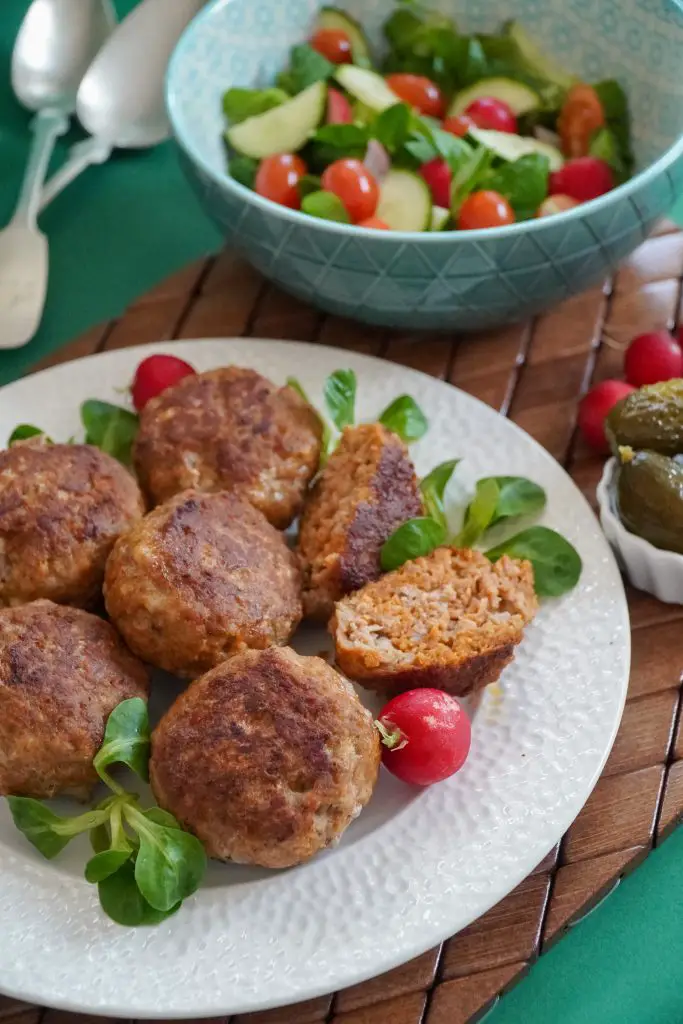
Cats have to eat meat to survive. Most cats like to eat meat, particularly grilled or roasted meats with gravy. Cats are considered carnivores but less likely than other carnivores to eat raw animal products. Therefore, no cat will turn down a mouth-watering meatball if you offer it to them. I’m sure they will eat it right away. However, I first looked at the ingredient list to ensure it was secure before giving them some frozen meatballs I had heated.
But is meatball can be safely eaten by cats. In this article, we will analyze if cats can eat meatballs.
Can cats eat meatballs?
Meatballs are full of protein, which is what your cat eats most of the time. On the other hand, cats shouldn’t eat traditional meatballs, whether you buy them frozen or homemade.
Recipes for traditional meatballs usually have egg, breadcrumbs, herbs, milk, onion, pepper, salt, and Worcestershire sauce. Some of these things are safe for cats to eat, but not all of them. And feeding your cat traditional meatballs puts them in danger of salt overdose and the adverse effects of onions, including anemia. In addition, the herbs in meatballs may result in painful gas and bloating.
What happens if my cat eats meatballs?
Acidic foods are harmful to cats. Because meatballs contain acidic ingredients, they can get too acidic and make your cat throw up or get ulcers in the stomach and intestines. They might also have trouble getting the meatball out of their bodies. Cats that consume meatballs containing onions or garlic will become very unwell and may require veterinary care if the symptoms continue.
This stuff can make cats very sick and even kill them. Other ingredients in meatballs, like salt or preservatives, can also hurt a cat’s health if it consumes too many. More harmful than onions and garlic is the allium schoenoprasum present in chives. Cats who consume meatballs may experience anemia or pancreatitis. Other ingredients may induce respiratory or cardiovascular issues.
What to do if your cat eats a meatball?
If your cat eats a meatball, it could make them sick, and the symptoms could be severe or even detrimental. Your vet might also give your cat antibiotics if she got salmonella from that meatball. Bear in mind that prevention is better than cure, so try to prevent feeding your cat anything that could upset its stomach.
Food poisoning symptoms in cats include vomiting, dehydration, diarrhea, and fever. If your cat only ate one or two meatballs, the amount of meat your cat ate may not have been too much for him to handle. In this situation, you should do all possible to prevent cats from digging the garbage and ensure they consume a healthy diet.
Keep an eye on things closely on things at all times and call your vet if they don’t get better in a few days. However, some cats may require intravenous fluids and other medications. This will be determined by how much food they ate, how their body reacted, and other variables.
How long will it take my cat to feel better after eating a meatball?
Different poisoning symptoms manifest in felines, making diagnosis challenging at times. The most common symptom is gastrointestinal distress, but cats may also vomit excessively or develop diarrhea. In some instances, cats may also exhibit signs of fever or dehydration.
When cats eat onions and garlic, they often get fatigued because they don’t have enough red blood cells, which carry oxygen through the body. Anemia makes cats feel weak and tired because it stops the red blood cells from making the hemoglobin they need. Cats can also have seizures due to low calcium levels.
Most cats get better in a few days after eating too many onions, but some may take longer. When cats eat a lot of garlic, they can get sick and have health issues that last a long time. You should call your veterinarian immediately for an accurate diagnosis and treatment if you think your cat may have consumed meatballs or other poisonous foods.
Are there cat-friendly meatballs?
Even though you can’t give your cat traditional meatballs, that doesn’t mean they can’t enjoy meatballs. You can make meatballs at home that are safe for your cat.
However, you can use any meat your cat likes, like chicken, lamb, pork, or turkey. And you don’t have to add vegetables to your meatballs, but if you do, choose vegetables that are high in water because they make the meatballs bigger and give them more moisture.
Then, you’ll need to add a cat-safe binding agent to keep the meatballs together. I like to use creamy cheeses like feta, but breadcrumbs will do. Along with this, eggs are necessary.
What can I feed my cat instead of meatballs?
Here are some of the great foods alternative for meatballs
Food alternatives |
What cat can get? |
Cooked eggs |
Protein and fats |
Cooked beef or chicken |
Protein |
Cooked fish |
Omega 3 fatty acids |
Vegetables (cucumber or cantaloupe) |
Vitamins and fiber |
Whole grains |
Protein |
Conclusion
Always consult your veterinarian if you want to feed your cat food that is not manufactured specifically for them. Even though cats love meatballs, you should not feed them since the ingredients harm a cat’s health. It may cause food poisoning and other digestive issues to your feline.
However, if you’re cat can’t get enough meatballs, you can make your version of meatball that is good for your cat. Moreover, you can also give your pet other food like cooked eggs, cooked beef, chicken, fish, vegetables, and whole grains instead of meatballs.
FAQs
Can a cat eat spaghetti and meatballs?
As long as the spaghetti and meatballs are prepared without salt and other harmful ingredients, cats can eat them.
Can cats eat meatballs in tomato sauce?
Cats should not eat meatballs in tomato sauce. Tomato sauce has a lot of salt, which can seriously harm your cat.
Can cats eat ground Beef?
Cats can eat cooked, spice-free ground beef. Don’t add spices like onion, garlic, onions, or pepper even though it might be tasty so that cats would not experience any adverse effects.


